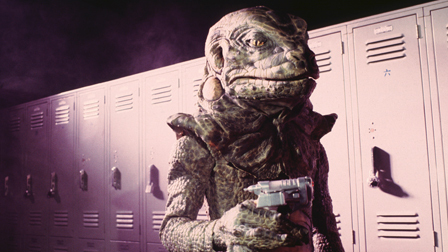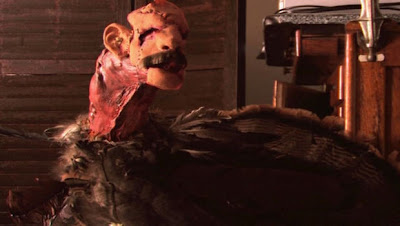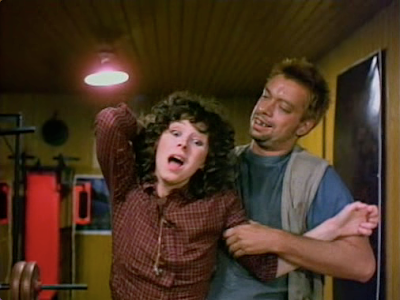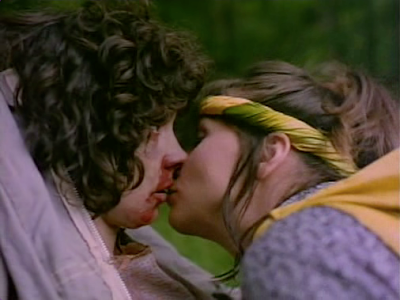Director: Robert Scott
Stars: Michael St. Michaels, Roxanna Augesen
Genre: Horror, Zombie, B-Movie
The Video Dead is such a fine example of '80s B-movie horror.
So there's this television right? And zombies come out of it. Why? I don't know, it's a fucking TV that zombies come out of, just shut up and watch that shit. So these zombies proceed in doing what zombies to best: make character cliches try to survive their 2 mile-per-hour wrath!
There's really no use in explaining the plot. You can read the film's title and guess what it's about and I'm sure you'd be pretty spot on. It's extremely similar to 1986's TerrorVision.
Though the plot is quite silly, I actually thought the zombies themselves were awesome. Not only do they look great, the make-up and effects are fantastic, but they go a bit further than your stereotypical zombies. For one thing they don't eat brains or flesh. Unlike Romero zombies for instance, the zombies in The Video Dead actually think they're alive. But when they see people who aren't zombies it makes them mad because that's what they want to be; alive. So the zombies kill anything that is living because...they're jealous and they want to kill them so they can maintain their delusion that they're alive. It's actually pretty damn cool.
You can even point a mirror at the zombies and it has a similar effect to when you point a cross at a vampire. The zombie sees their reflection and because they hate to see what they become, and because it doesn't fit with the delusion that they're alive, they run away.
To kill the zombies, since they think they're alive, you don't have to kill their brain or anything, all you have to do is make the zombies think you killed them. The zombies, as the film explains, don't actually feel pain or aren't even susceptible to pain. But since they think they're alive all you have to do is simulate the act of killing them, e.g., shooting them in the chest with an arrow, and the zombie will think they are actually dying. So it's a completely psychological thing. Anything that thinks it's alive, will think, based on pre-conceived notions, that certain things will kill them. The zombies in this film are fucking awesome.
Unfortunately everything else is a bit lackluster.
The acting is all amateur. It's not completely awful, just nothing very great. All the characters are silly, the plot is silly. It's a very campy film, and can provide with plenty of unintentional laughs.
The zombies are cool but everything else is what you'd expect from an '80s low-budget horror movie. The Video Dead is like the perfect example of the independent industry of the VHS generation. Watch it. It's fun. The zombies are awesome and most of the mediocre stuff will make you laugh. Also, there's chainsaw-wielding zombies. Oh, and at one point all the zombies sit down and eat dinner...and then decide they want to go dancing. It's actually pretty hilarious.
Stars: Michael St. Michaels, Roxanna Augesen
Genre: Horror, Zombie, B-Movie
The Video Dead is such a fine example of '80s B-movie horror.
So there's this television right? And zombies come out of it. Why? I don't know, it's a fucking TV that zombies come out of, just shut up and watch that shit. So these zombies proceed in doing what zombies to best: make character cliches try to survive their 2 mile-per-hour wrath!
There's really no use in explaining the plot. You can read the film's title and guess what it's about and I'm sure you'd be pretty spot on. It's extremely similar to 1986's TerrorVision.
Though the plot is quite silly, I actually thought the zombies themselves were awesome. Not only do they look great, the make-up and effects are fantastic, but they go a bit further than your stereotypical zombies. For one thing they don't eat brains or flesh. Unlike Romero zombies for instance, the zombies in The Video Dead actually think they're alive. But when they see people who aren't zombies it makes them mad because that's what they want to be; alive. So the zombies kill anything that is living because...they're jealous and they want to kill them so they can maintain their delusion that they're alive. It's actually pretty damn cool.
You can even point a mirror at the zombies and it has a similar effect to when you point a cross at a vampire. The zombie sees their reflection and because they hate to see what they become, and because it doesn't fit with the delusion that they're alive, they run away.
To kill the zombies, since they think they're alive, you don't have to kill their brain or anything, all you have to do is make the zombies think you killed them. The zombies, as the film explains, don't actually feel pain or aren't even susceptible to pain. But since they think they're alive all you have to do is simulate the act of killing them, e.g., shooting them in the chest with an arrow, and the zombie will think they are actually dying. So it's a completely psychological thing. Anything that thinks it's alive, will think, based on pre-conceived notions, that certain things will kill them. The zombies in this film are fucking awesome.
Unfortunately everything else is a bit lackluster.
The acting is all amateur. It's not completely awful, just nothing very great. All the characters are silly, the plot is silly. It's a very campy film, and can provide with plenty of unintentional laughs.
The zombies are cool but everything else is what you'd expect from an '80s low-budget horror movie. The Video Dead is like the perfect example of the independent industry of the VHS generation. Watch it. It's fun. The zombies are awesome and most of the mediocre stuff will make you laugh. Also, there's chainsaw-wielding zombies. Oh, and at one point all the zombies sit down and eat dinner...and then decide they want to go dancing. It's actually pretty hilarious.


















































